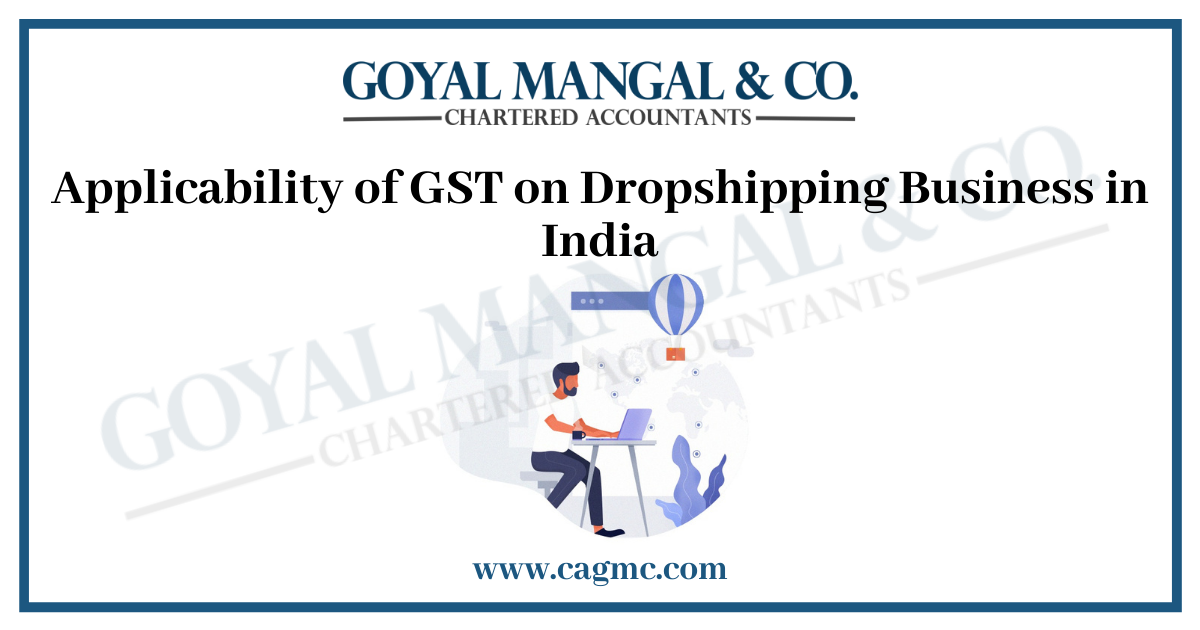In this article we will came to know about Drop-shipping Business with the applicability of GST thereon. These days, this business is emerging rapidly because of its no stock requirement which leads no any investment requirement and also no risk of dead stock.
What is Dropshipping Business?
Dropshipping is a kind of business in which the seller sells the product which is not owned by him i.e. the seller take order from the customer and passes the order to the third party (who is producer or merchant of the ordered item) and then that third person will provide the delivery on behalf of the seller. In this business the seller provide invoice to the customer on his name and the third party will issue invoice not on the name of actual customer but on the name of seller and receive the order amount from the seller itself.
Legal compliance under Dropshipping business.
- Formation of Proprietary/Partnership Concern or Company.
- Entering of contract with Supplier/Manufacturer.
- GST and Customs Compliances.
However, in this article we shall have a look on GST applicability on Dropshipping Business

Advantages of GST on Dropshipping Business
GST is advantageous in the following ways:
- Removes cascading tax effect
- Higher threshold for registration
- Composition scheme for small businesses
- Online simple procedure
- Lesser compliance
- Defined treatment for eCommerce
- Increased efficiency in logistics
- Regulating the unauthorized sector
- Completely technologically driven
Documents Required for GST Registration for dropshipping business:
- PAN of the applicant
- Aadhaar Card
- Photograph and Authorized signature of the owner
- Address proof of the place of business
- Bank account details/Cancelled cheque
- Partnership deep/incorporation certificate, as the case may be
Applicability of GST on Dropshipping Business
- When goods are purchased and sold in India- In case, when the customer and the merchant/ producer both resides in India. Here, the person involved in drop-shipping business is required to accept the order from the customer and pass it to the merchant/producer within India. Hence both, the person doing drop-shipping business as well as the merchant/producer are required to get registered under GST if the turnover exceeds the threshold limit of Rs. 20 Lakhs/Rs. 10 Lakhs accordingly or as if the sale is made outside the State/ UT.
- When goods purchased from India but sold outside India- In this case the merchant/producer who is suppling goods on behalf of the person in drop-shipping business considers it as normal sales and GST compliances will be applicable accordingly.
While for the person in drop-shipping business the sale will be treated as Export sale and has option to either apply for Letter of Undertaking and sell the goods without GST or can pay IGST at the time of sales and then claim refund afterwards.
- When goods are purchased from Outside India and sold within India- Here in this case, for the person engaged in drop-shipping business is buying goods from outside India hence it will be treated as Import of goods and he is required to pay IGST on reverse charge basis. Further he can claim ITC for the payment of such IGST.
- When goods are purchased and sold outside India.
There are two basic things to understand this case:
- The person involved in drop-shipping business has received order from outside India which will be forwarded to the supplier who is outside India, who will deliver the product to the customer, and
- The person involved in drop-shipping business is essentially providing customer forwarding/lead generation service to the supplier who is delivering the product the customer/
For the first point, goods are being delivered from the supplier outside India to the customer outside India, which will neither be considered as Import to India nor Export from India. Hence, this transaction is outside the ambit of GST.
For the second one, supply of service is outside India hence it will be treated as Export of service. Under GST Law, for any business exclusively engaged in export of goods and services is not required to get register itself under GST.
However, any person engaged in this business can get itself registered under GST for getting other benefits of operating on the platforms like Facebook, etc for running promotional ads and also for getting refund of GST paid for using such platforms. Most importantly the international payment portals like PayPal and many more requires GST registration before getting registration on these portals.
Filing GST Returns for Dropshipping Business
- To file GST returns you need Sales Invoices, Purchase Bills, Tax charged on sales invoices and tax paid on purchase invoices. You need to file 2 monthly returns and one annual return.
- The manual entry is only on the first process of filing GSTR1 before 11th of every month. The other filing GSTR 3B will get its value from your filing of GSTR1 and your vendors’ and needs to be done before 20th of every month.
- Your buyer purchases from you and you are sending sales invoice to him. In this case, you need to file all those invoices in GST as GSTR-1 by 11th of next month.
- By 20th of the month, file GSTR 3B where in all the sales along with all the input tax credit from purchases are declared (You can also reconcile GSTR-8’s TCS input here if you are selling in marketplaces).
Takeaway
As per the current market situation, Dropshipping is one of the most complicated tax laws in the whole world. Every businessman has to keep track of everything if they are selling their products worldwide and they have to follow the compliances as per country law. Sometimes businessmen and their accounting fees, however, they lose thousands of extra taxes and penalties as per country law. Consult CAGMC who has vast experience in managing the financials as per the E-commerce business model and reduce the sales tax and income tax return in India so that you can grow your business in the worldwide competition and can earn high profits from your business.


